Month 11:15, Week 2:7 (Shibi'i/Sukkot), Year:Day 5955:309 AM
2Exodus 7/40
Gregorian Calendar: Wednesday 2 January 2021
Return of the
Elijah Prophets
I. Mari & the Ancient Pagan World
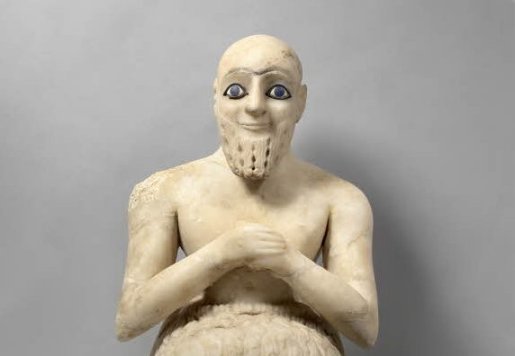
Introduction
Shabbat shalom kol beit Yisra'el and Mishpachah and welcome to the promised series on prophets and prophecy. We are going, over the next few weeks, to work our way through - not so much the individual prophets, their prophecies and the books that record them - but the idea and experience of prophecy over the ages so that we can get a good handle on it and not be misled by all the counterfeits that every age births, including our own.
The State of Christian Prophecy Today
There is a fundamental ignorance in the Body of Christ as to what a navi or prophet actually is and does. In the aftermath of the American Presidential election, those claiming to be nevi'im (prophets) have, for the most part, thoroughly disgraced themselves and and are rightly the object of scorn and mockery by atheists. Their attempts at damage control this time round will not work because as I have said before - and unfortunately not even all of our people yet believe me - Yahweh will not be using lawless believers in the future to act in any Elijah-type prophetic capacity. In fact, I have received the clearest message to ignore them altogether. And the reason is because whatever authority they possessed in the past (and it was very limited indeed) is being - and has already been - passed on to the arising New Covenant Elijah Nevi'im (Prophets).
The Purpose of This Series
My task in this new series, for as long as it takes, is to now explain in depth what an authentic end-time navi (prophet) does and doesn't look like. To begin with, no understanding of what the New Testament or New Covenant navi (prophet) is possible without a thorough understanding of what a Tanakh (Old Testament) or Old Covenant navi (prophet) was like because the one builds on the other. And what may surprise some of you to learn is that although there were many of these nev'im (prophets) anciently, after whom a number of Bible books are named, they were only around for a comparitively short period of time. So understanding that period of time becomes very important indeed and why it is they were mostly around then. I hope you will find this study interesting and exciting even if it may be a little technical at times.
To Those Who Want to be Prophets
However, I am going to add a prediction of my own here and now because some of you may also find this subject bewildering and perplexing, if not astonishing and perhaps, at times, frightening too. By the time we have finished, none of you will ever want to be a navi (prophet) unless you have the 100 per cent assurance that Yahweh has called you, and that will only happen if you are authentically born-again and Torah-obedient. Those who want to be 'prophets', with the authority and prestige that follows, tend not to have the remotest idea what the calling entails - the depth of commitment required or the severity with which false prophets are punished - a reason nearly all of the modern so-called 'prophets' aren't nevi'im (prophets) of El Elyon (the Most High) at all...and certainly not the charismatic, babbling, crazy-eyed Kenneth Copelands of our own time and others like him. I fear greatly for such people. The 'prophets' of Western Christendom are living under a gigantic delusion of assuming that because they are 'Christians', because (as they suppose) they are 'Spirit-filled' (a highly subjective and untestable claim, by the way), and because something supernatural is happening to them, that it must necessarily be from Elohim (God).
The Two Common Reasons Believers Search the Prophets
With that said, let us get into the meat of today's teaching. In the popular mind a navi (prophet) is a someone who has the power to say what is going to happen in the future. And that's typically the way Christians and Messianics have viewed the nevi'im (prophets) of the Tanakh (Old Testament). Most consult them in order to do one of two things:
- 1. To examine the predictions made about the birth, life and death of Yah'shua the Messiah (Jesus Christ), both to build up their own testimonies and for the purposes of evangelism, a very noble and excellent task indeed which we should absolutely encourage at all times (see, for example, Messianic Prophecies; and
- 2. To learn more about events yet to come which, from our perspective, still lie in the future, and I am sure you can think of a lot of popular themes, like the coming of the Antichrist, the coming of Christ Himself the second time, and key end-time historical events.
Forthtelling and Foretelling
However, as you read the books of the nevi'im (prophets) carefully you will soon come to realise that most of what they were predicting actually concerned, not the distant future, but their own times. And unless we first of all deal with this, the primary meaning of the nevi'im (prophets) and their prophecies, we are going to start imagining things that aren't there. This particular aspect of prophesying, which is about the prophets' own contemporary historical scene, is called FORTH-telling, and is very different from the FORE-telling, or looking into the future, that in the popular mind we chiefly associate with prophecy. If you can grasp this right at the beginning it will spare you a lot of grief in the future as ill-informed Christians and Messianics, who imagine themselves to be prophets or great expositors of the Scriptures, wrongly apply prophetic Scriptures to their own day instead of the days of the prophets themselves. Therefore, first and foremost, the nevi'im (prophets) are communicating the message of Yahweh to the people and the circumstances of their day and not ours. Always interpret their writings from this perspective first of all and don't go wandering off down some imaginary path and assume the same admonitions and prophecies can be applied to our day in any more than the most general of terms.
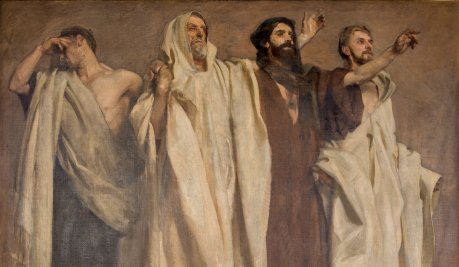 The Old Testament prophets were 99% of the time speaking to their day only
The Old Testament prophets were 99% of the time speaking to their day only
Most Old Testament Prophecy Does Not Concern Our Situation
The next thing you need to be aware of is equally as important. When the nevi'im (prophets) prophesied about the future, this was almost always based on observations in their present (and not ours), and the future to which they were referring was not, in nearly all of the cases, hundreds or thousands of years in the future, but near at hand. It concerned the fate of the people - whether Israelites or neighbouring nations - to whom they spoke. So when they prophesied, it was about imminent destruction and defeat in battle and about the fall of Jerusalem, or Nineveh, or Babylon, events that were to happen very soon, usually within a few years or less than a century at the most, and in cities known to everyone then. The ancient biblical nevi'im (prophets) usually did NOT have us in mind, and there aren't secret codes just for the 'privileged few' in our day. Each æon or age has its own nevi'im (prophets) who focus on each time period specifically - not many, so you have to search for them carefully. The Bible nevi'im (prophets) did not have in mind Washington DC, Berlin, Moscow, Paris, Bejing, the USA, South Africa, South America, Pakistan, Kenya, Nigeria, Kazakhstan, Australia, and the like because they were't writing for us in the 21st century. Indeed the furthest geographical and national extent of 99.99 per cent of the prophecies is Egypt and Ethiopia in the south, Persia in the east, Greece and (later) Rome in the west, and Assyria (and what's now Turkey) in the north. Why? Because the nations beyond these were of no interest to Israel because they were too far away to impact them either as potential invaders or traders, and therefore had little or no direct contact with them. If you can get that fixed in your mind you will spare yourself a lot of exegetical or interpretative grief. People like Hal Lindsey may have made a lot of money off their popular books in the second half of the 20th century but their prophecies were largely all wrong.
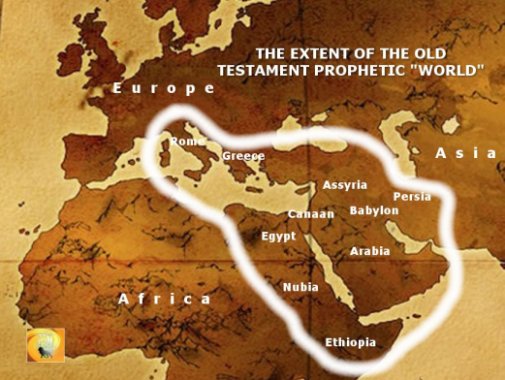
Distant Future Prophecies
Yes, some - a few - of the Tanakh (Old Testament) prophesies did, and still do, look far into the future, events that had nothing to do with the imminent disaster facing Israel or Judah. And their faith in Yahweh enabled them to express hopes which were by no means immediately fulfilled. Some prophecies were conditional, like the building of a Third Temple seen by Ezekiel if Israel and Judah in exile would repent, which can never take place now because they didn't repent. And anything that pretends in our day to be a 'Third Temple' you can know for sure is fake. Yes, there are a number of very important Scriptures that do indeed speak of the coming of Messiah and the end of the world, but they are few and far between relative to the total number of all the other prophecies, even if they are certainly very important.
People are Usually Absorbed With the Present
In the light of what happened a week ago when I last spoke to you [1], and what has happened in America, roughly how many Americans do you suppose are thinking about events 50 or more years from now? Most believers want to know what's going to happen with the current administration, whether Trump is either going to be impeached or will be coming back, whether there will be civil war, whether the economy will collapse, whether Red China will invade Taiwan, and so forth. Yes, before the election, many were thinking about the Second Coming and wondering when, but most I guarantee are thinking now thinking differently - about the weeks and months ahead and their own personal circumstances. And if a new American civil war does erupt, people - but especially Americans and their neighbours in Canada and Mexico - will be completely absorbed with that and be wanting to know what to do day by day, let alone 40 years in the future. As I speak what people mostly want to know is if the Covid-19 lockdowns will ever end and whether they should take the mandatory vaccines or not. People's interests and attention spans constantly change with the ever shifting circumstances.
Yahweh True to His Promises
A large portion of the prophecies in the Tanakh (Old Testament) are about similar situations but long ago. Back then people wanted to be assured of their safety and what they had to do to guarantee it. That's why when you're reading the Tanakh (Old Testament) nevi'im (prophets) you have got to plunge deep into the historial events surrounding particular prophecies and not read the Scriptures superfically. You see, if the truth be known, most believers dip into these passages looking for an instant message for the here and now. They aren't at all interested in their historial context. And that's typically where people go wrong. At the very best we can find encouragement to see how Yahweh was true to His promises in the past and how, when the conditions were met for His intervention (spoken or implied), those promises to come to pass. From these stories of the past we can know that Yahweh will be true to concrete promises He may have made through authentic prophets today.
The Disillusionment That Follows False Prophecy
But what happened back then that is similar to what is happening today? Numerous false prophets said this and that, their prophecies didn't happen (because theirs were false promises based on personal desires - usually for good news and not bad - rather than truth, and often to appease ruthless rulers), and then as now, an awful lot of Christians have become disillusioned when the false prophetic good news didn't happen. We are apt to forget that throughout the Tanakh (Old Testament) prophecies, and linked to redemption from tribulation, there is always a clear and unmistakable admonition to be obedient to the mitzvot (commandments). You can never escape that, even if Antinomians (law-rejecters) do. So if the modern prophets aren't obeying the mitzvot (commandments), why should you be surprised when I tell you that they are usually being led by false spirits? What is so shocking about that? Why are we horrified when their prophecies fail and they are seen to be false, however 'nice' as people they may seem to be? And if you don't believe in obeying the Torah, why are you even bothering reading these accounts in the Tanakh (Old Testament) which all revolve around Torah-obedience? It never ceases to amaze me how Christians, for example, turn to the Psalms for inspiration, quote from them enthusiastically, but skip over all the parts admonisting obedience to the Torah (Law)? Torah is integral. You can't ignore it and to do so is to change the meaning of those Scriptures.
The Need for Huge Adjustments
Here's the thing. Christendom has got to learn to make huge adjustments theologically and practically before it can even hope to receive accurate information from Heaven, let alone be prepared to welcome back the returning Messiah. And that, as in adjusting to any new relationship, is going to take time because the Elohim (God) the people thought they knew isn't necessarily Yahweh but various entities posing as Him in different guises...entities keen for you to ignore the teachings of the true nevi'im (prophets) of the past and present, which is why I am making this series starting today. In other words, to put it bluntly, it's a demonic issue that needs to be resolved.
Transitioning Between False and True Beliefs
Christendom, as presently constituted with its 32,000 or so denominations labours under a huge handicap of embracing, and being burdened with, layer upon layer of false tradition sitting atop one another, compressed like sedimentary rock over the centuries and millennia. We, here, in this ministry have peeled back, unpacked and dismantled a lot of those lies and traditions to expose the emet (truth) but there's still more to do. Remember that the transition between the old beliefs and actual reality usually takes a couple of generations, one at the very least. Those positioned in the middle of the two tend therefore to be the most confused. Take the period of the reign of King Saul - that's a perfect example, one of confusion and anarchy. Why? Because Saul was sandwiched between the old and the new - between the ideal Israelite Confederacy and the new totalitarian Monarchic System which Yahweh warned against adopting because in autocratic systems it is rare to get righteous rulers. Saul and his people literally had one foot in the old and one in the new. That is the legacy of my generation only we're sort of moving in the other direction now towards the original ideal of a Confederate New Covenant Israel led by 'Elijah Prophet Apostles'. The vast majority of Tanakh (Old Testament) nevi'im (prophets), it must be noted, operated in the unstable period of the monarchs of both Israel and Judah.
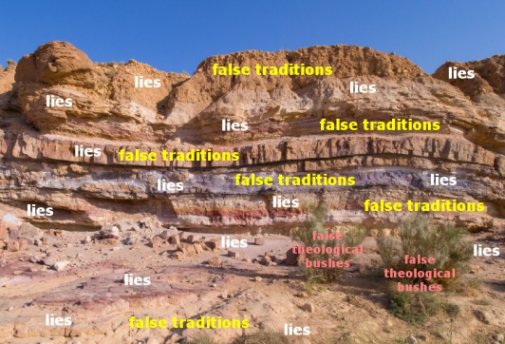 The chaotic denomination stystem is constituted of layer upon layer of
The chaotic denomination stystem is constituted of layer upon layer of
compacted lies and false traditions over the centuries and millennia
Easier to Get Out of Egypt Than to Get Egypt Out
The reason they were so necessary and important is because it is so much easier for you to get out of Egypt than to get Egypt out of you. Getting the devil's way of thinking and being out of your system - your way of thinking, feelings, reflexes, and so on - takes a one or two generations as proven by the First Exodus from Egypt, something that must happen again in our day in the Second and Last Exodus. A stable Second Exodus generation has to be raised by a generation that has already gone through the gruelling the process of overcoming through great struggle. And escaping Pharaoh's Egypt was hard enough, wasn't it? Think of all the plagues and the added burdens imposed by Pharaoh on the Israelites. What they didn't reckon on was the ugly truth that they still gave Egyptian culture their allegiance in the mind and heart, so building a Golden Calf came relatively easily to these nominal ex-pagans, converted largely my miracles, who were still pagans inside. You see, sanctfication, like losing weight or getting an education, requires a gradual transition, step by step, which requires time. Falling into apostacy proceeds in exactly the same way only in reverse, at first usually in imperceptible increments and then with alarming rapidity. We're in the latter phase of that now in the West. Likewise we often start the journey enthusiastically only to lose the cutting edge when we pass through those slow, painful times where certain sins can only be excised through the gradual erosion of tribulation and hardship generally. And it's those hard times that acdtually make or break us so they should never be despised or looked down upon.
Prophets are Not Usually Made in a Day
The first ancient prophets did not arise ready-made, as it were - out of nothing. So it comes as a surprise for some to learn (and especially the ultra-conservatives) that in many other cultures, eastern and western, ancient as well as more modern, you find men and women who are not altogether unlike Yahweh's early nevi'im (prophets) of the Tanakh (Old Testament). At the same time, it is possible to make too much of these similarities (as liberals are wont to do in order to justify their atheism, agnosticism and lawless disposition) as it is to make too little of them. I mention this only because sceptics, who have often done more homework than Christian conservatives, will point this out, and you need to know how to deal with them. We in our turn must be scrupulously honest when we do our homework.
Limited Similarities Between True and Pagan Prophets
However, the actual similarities netween the pagan prophets and Yahweh's are limited and can be explained in all sorts of ways. The nevi'im (prophets) of the Scriptures stand out as different from all the various pagan characters in important ways. Nevertheless we should not be surprised to find more similarities in the early days than later on in Israelite history because all spiritual development goes through gradual processes. I meet converts coming from all kinds of backgrounds who bring with them elements of their former belief systems but over time the false gradually gets washed out leaving more and more that's true. We all have to pass through the metaphorical 'sieve of truth' and as anyone who has made jam knows it takes time letting the liquid drain through the muslin filter. I hope this will help those coming out of a background where 'prophets' are acknowledged as in Hinduism, Islam, Shamanism, the New Age, Mormonism, and Charismatic/Pentecostalism to name but six because some of them may indeed have the 'prophetic gift' per se yet have not been properly purified or Torah-trained to use it the way Yahweh intends. Let me explain what I mean.
The Similarities of Prophets from Different Religious Traditions
If you look throughout history at the various religions that admit a prophetic element you will notice, as a rule, that their 'prophets' fulfil the following criteria which also became common to the nevi'im (prophets) of Israel:
- 1. They were wholly devoted to the 'god' whom they worshipped;
- 2. They were 'inspired' and under 'divine' constraints and showed signs of ecstasy and abnormal behaviour;
- 3. They received 'revelations' from their 'god' and announced them publicly; and
- 4. They had a 'special call' from the 'deity' to fulfil his purpose unconditionally.
That such commonality exists at a basic level ought not surprise us since Satan usually imitates and twists rather than innovates, and then humans progressively change things even more. This kind of 'evolution' is real enough. Look at any phenomenon in the human experience and you will see this activity at work.
The Pagan Kingdom of Mari, circa 1700 BC
Because nothing ever arises in a vacuum, and because it soon becomes obvious upon close inspection of the texts that the earliest of the biblical nevi'im (prophets) show one or two similarities with the pagans in their mannerism and behaviours, what we're briefly going to do now is get into our 'Time Machine' and go back about 3,300 years, to around 1700 BC, and to the ancient kingdom of Mari in Northern Mesopotamia (see map below). I have chosen this pagan culture for a reason because this is where some of Israel's ancestors came from. You'll know that both Isaac and Jacob travelled back and forth to this area in order to find their respective wives - Isaac to marry Rebekah, and Jacob to marry Leah, Rachel, Bilhah and Zilpah (Gen.25:20; 28:14).
The Clay Tablets of King Zimri-lin
Back in 1933 a French archaeologist called André Parrot discovered 20,000 clay tablets with cuneiform instriptions at Tell el-Hariri, the site of the royal palace of Mari King Zimri-lin (today in Syria) and amongst them were the records of men who sound just a little bit like the nevi'im (prophets) of Israel. One of the tablets describes the dream of a man called Malik which he said he received from the god Dagon. In the dream he was told to pass on the message to the governor who would present it to King Zimri-lin. The message said that if the king was obedient to Dagon the deity would in turn grant him great victories over the 'men of the south'.
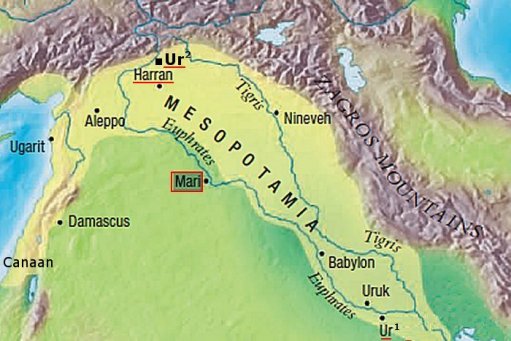 Map showing the location of Mari, Harran, the two Ur's in Mesopotamia
Map showing the location of Mari, Harran, the two Ur's in Mesopotamia
about the time of the early patriarchs Abraham, Isaac and Jacob
Prophetic and Geographical Connections
There are two things of interest about this 'prophetic message':
- 1. This account of a god, albeit a pagan one, sending a message to a king through another man reminds us of several Tanakh (Old Testament) stories. The navi (prophet) Micaiah had a message from Yahweh to Ahab (1 Ki.18; 21) and in precisely the same way Isaiah confronted both Ahaz (Is.7) and Hezekiah (Is.37:21ff.) with a message from Yahweh; and
- 2. Maybe some of you will remember Jacob and Rachel's second son, Benjamin, whom Rachel bitterly called Benoni with her dying breath (meaning 'son of my sorrow/pain' as the birthing killed her) but whom Jacob renamed 'Benjamin' which literally means 'son of the right hand', the right hand being the south when facing eastwards. This was the year 1732 BC, the height of the Mari empire. Why is that interesting? Because it establishes a concrete connection between Jacob and the land of Mari where his relatives lived in the city of Haran [2]. It might also interest you to know that the 'Ur of the Chaldees', from whence came Abraham, may very well have been located quite close to Haran in the Mari Empire too and not, as traditionally thought, near the mouth of the Persian Gulf south-east of Babylon and Uruk. Suffice to say that 'Benjamin' was a Mari term that meant 'son of the south' or 'right-hand', a distinctly Mari expression. Facing east denotes facing Eden (Gen.2:8), a reason the Temple was built facing east but also because the Messiah was expected to come from the east as represented by the Star of Bethlehem. The right hand always represented the place of honour. To understand the importance of the Tribe of Benjamin, see my series of teachings on Benjamin and Benjamin Revisited which will help you unravel the mystery further.

The Mihhum and Apilum
Two other tablets I will make brief mention of that you will see the link between the Mari prophets and the Israelite ones. I only make mention of these so that you may be assured that Genesis is authentic history and not fable, and that what it describes fits perfectly into the known time period. But there are also clues as to how the office of 'prophet' evolved in Israel. In a second tablet the man entrusted with the message is called a muhhum and the king is ordered to make sacrifices for the dead. This is obviously raw paganism and very different to the Israelite faith and nevi'm (prophets) and indeed there are hints here of the equivalent of Molech worship in Mari, human sacrifice being implied. In a third tablet we find mention of an apilum meaning an 'answerer' in which the 'god' Adad demands a temple be built for him, claiming he was reponsible for putting Zimri-lin on the throne and building him a palace. If the king agreed, he would prosper even more but if not he would lose all he had.
David Ordered Not to Build a Temple, & His Dynasty
This reminds us of a conversation between the navi (prophet) Nathan and King David (2 Sam.7) which deals differently with the same question. In this case David is told not to build a temple to Yahweh (because he has too much blood on his hands) but instead Yahweh promises to build a house for David, not a palace but a dynasty. Any king who disobeys Yahweh and His Torah (Law, Instruction) will be punished, though the dynasty will be preserved but only through the grace (undeserved loving-kindness) of Elohim (God) in order to ensure the coming forth of the Messianic Seed, Yah'shua (Jesus), according to prophecy.
The Baru, Seers and Prophets
To give you another illustration, one of the Mari tablets speaks of a group of people called baru which means 'seers'. These people are different from the muhhum and the apilum: instead of receiving a message from the 'god' and passing it on to the king, they seek advice from the 'god' by means of omens. Here the resemblance to the Tanakh (Old Testament) is less obvious because that is not what a biblical 'seer' or ro'eh does. A 'seer' sees visions whereas a navi (prophet), though he can be a ro'eh or 'seer' too, doesn't have to have visions in order to prophesy. What's interesting is that in early Israel no distinction is made between the two and whoever later compiled and redacted 1 Samuel added a footnote which our modern Bibles puts in parentheses, to indicate this is a later addition, which reads:
"(Formerly in Israel, if a man went to inquire of Elohim (God), he would say, 'Come, let us go to the seer (ro'eh),' because the prophet (navi) of today used to be called a seer (ro'eh))" (1 Sam.9:9, NIV).
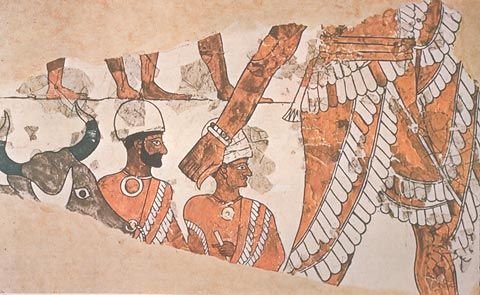 A royal procession in ancient Mari - how Abraham may have looked
A royal procession in ancient Mari - how Abraham may have looked
The Evolution of Biblical Language
Now you may think that to be insignificant but it absolutely isn't. What it's telling us is, first, that it was not uncommon for texts to be edited or redacted, and for the editor or redactor to add the odd note here and there to explain to his readership many centuries later how language had changed and how certain words meant different things 'back then' compared to 'now'. That's why I keep telling you that in order to have a cutting-edge ministry or witness you need to study history and languages, or otherwise find teachers who know what they're talking about who can tell you about these things as I am doing now, if you are going to properly understand the Scriptures. That's why it isn't wrong for us in the 21st century to add scholarly footnotes in our Bibles explaining how, for instance, the use of words has changed over thw ages, words like 'soul' and 'spirit', for example, over which whole denominations and even cults have formed because they don't do serious scholarship. (This is a reason I reject the HalleluYah Scriptures whose editors refuse to do this claiming that their translation, which they lifted from another version, is 'inspired' and in no need of such). Just ask people from various denominations (like the Adventists, Jehovah's Witnesses, Messianics, Catholics and Methodists) what 'soul' is and what 'eternal' means and you'll not only get different definitions but incredible spin-off doctrines like 'soul-sleeping' and 'eternal hell' which bear no resemblance to reality concerning the afterlife. It's the same with 'prophets', 'revelators', 'dreamers' and 'seers'. So bear with me because this is important!
The Apilum Prophets of Baal at Carmel
Admittedly, that's not a lot of historical data to work with and I have had to cut down the material I would like to share with you so as not to make this too long. You see, liberals are all-to-quick to read into these few facts more than there actually is in order, as they hope, to discredit the historicity and literal truth of the Bible so that they can reinterpret and reinvent religion more in line with their own urge to be lawless. We know from the Bible records that there were 'prophets' outside of Israel, and specifically those serving Baal and Asherah in Phoenicia (1 Ki.18) whom true nevi'im (prophets) like Elijah confronted and destroyed, sometimes spectacularly. The thing about the pagan apilum is that they bring no message from their god but merely seek to persuade him, by prayer and by cutting themselves, to do this or that for them. And you'll recall that's exactly what they did on Mt.Carmel, with Elijah taunting them, remember?
"'Shout louder!' he said. 'Surely he (Baal) is a god! Perhaps he is deep in thought, or busy, or traveling. Maybe he is sleeping and must be awakened.' So they shouted louder and slashed themselves with swords and spears, as was their custom, until their blood flowed. Midday passed, and they continued their frantic prophesying until the time for the evening sacrifice. But there was no response, no one answered, no one paid attention" (1 Ki.18:27-29, NIV).
The 'Prophets' of Baal
So what the text says the prophets of Baal (or 'seers' as they would still have been called probably) when they "continued their frantic prophesying" doesn't mean they were seeing visions or bringing forth a word of knowledge or revelation from Baal - it means they were acting like the apilum of Mari and trying to persuade their deity to act by supernaturally igniting the sacrifice that was set up on Carmel to test them, as Elijah would in fact do accorsing to Yahweh's Davar (Word). The fact that it was "frantic" or that they "raved on" (as the NRSV translates it) certainly conjures up in the mind a crazy, hysterical scene, and if you've ever seen religious devotees cutting themselves you will know it attracts demons like nothing else and makes them behave insanely. So this is a very different kind of 'prophesying' to what we're familiar with, remembering this is pagan prophesying, of course, even if there are some crazy goings-on in the charismatic movement today. Anyway, the fact that the Tanakh (Old Testament) calls these Baalites 'prophets' should remind us to be careful when it comes to the use and interpretation of language which may not mean the same thing in every period of history, just like the word 'soul' means something completely different in English to the Hebrew and Greek it derives from.
The Story of Wen-Amon
One more piece of evidence, if I may. There is a document from Egypt called The Story of Wen-Amon (or Amun) that describes events just like those at Carmel, though a lot tamer, only this time the the location is Byblos (the Greek for a Phoenician city called Gebal, named after the papyrus plant used for making paper, where we get our word 'Bible' from and indeed the word in many European languages for 'library', as in bibliotek in Norwegian and Swedish). Anyway, the account dates to 1000 BC, around the same time as Elijah was ministering (from about 940 BC), again giving us confirmation that the historical details in our Bibles, which compare with these pagan prophets and their practices, are accurate.
"Wen-Amon was an Egyptian who was sent to the port of Byblos to buy timber. While he was there he was robbed of the money with which to pay for it and was therefore detained in the harbour until the thief should be caught. He erected a tent on the beach and hid in it an image of his god, Amon, which he had brought with him on the voyage. During this time the king of Byblos went to his temple to offer sacrifice to Baal. While he was doing so a certain young man fell into an ecstatic trance and it was revealed to him that Wen-Amon had brought an image of Amon with him and hidden it in his tent. This information he passed on to the king.
"The rest of the story doesn't concern us. The important point for our purpose is that a 'god' took possession of a man and revealed secret knowledge to him which he passed on to the king" [3].
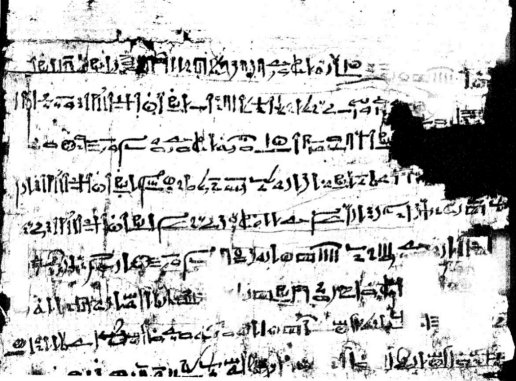 The original parchment containig the story of Wen-Amon
The original parchment containig the story of Wen-Amon
Pagan Prophets, Psychics and Demonic Controllers
Now, of course, we are not suprised that this sort of activity went on in the pagan world because it was common then just as it is today, only modern psychics who sometimes predict things correctly do not have a 100 per cent accurate track record in the same way that Yahweh's nevi'im (prophets) do. That a demon would be able to supply the young man in the story of Wen-Amon with such information should not surprise us either for it would have been a simple matter for what we call 'watcher-demons' to have observed Wen-Amon's activity and then passed the information directly to a pagan devotee through a demonic trance. This happens all the time even today in certain quarters and I myself have watched it going on. Indeed I knew a lady, who came to Christ, who was a high-level satanist psychic who had previously done this sort of thing all the time for her Deep State clients.
DThe Occultists and Balaam
What I most want you to be aware of at this stage is that this kind of counterfeit spiritual activity goes on all the time, and always has, and to not be impressed, seduced or 'enchanted' by those who may possess secret knowledge about you which you never shared with anyone. I realise that whose who do not know Yahweh or understand much, if anything, of the unseen world, can quickly be taken in simply because it is supernatural and not something human beings can readily do 'in the natural'. Don't be fooled by the occult. Demons are whispering into people's ears all the time and they can start taking control of people's lives, to their great harm, when they involve themselves in occult activities. You know, I have met people who clearly had the gift of prophecy, which they received at birth as Jeremiah did, who went on to prostitute it in the service of their own careers and Satan's kingdom. I've known ex-Christians do the same and pervert their gift in the New Age movement. You all know of one pagan prophet in the Bible who was thus gifted whom Yahweh and was used briefly to a rightous end in blessing Israel contrary to his contract with the King of Moab before he turned rogue again and had to be dealt with most severely - I am speaking of Balaam, the one with the talking donkey (Num.22-23; 31; Dt.23).
The Prophecies of Neferte
There is one other example from the ancient pagan world I want to share with you that is recorded in an Egyptian document from an even earlier time, 2000-1750 BC. It's called The Prophecies of Neferte and concerns the nation of Egypt itself. Although it's quite evidently a piece of political propaganda supporting the Pharaoh (a bit like the Books of the Maccabbees that support the Pharisees and their faked Hanukkah tradition) it's instructive for our purposes:
"The story tells of a much earlier Pharaoh, Snerfu, who was looking to be entertained in his court. His courtiers recommended that a certain wise man or priest called Neferte be invited to entertain. The entertainment consisted of foretelling all the evils and calamities which would take place in Egypt until a new king should come to the throne. Naturally, the 'new king' was the one for whom the document was written" [4].
The Prophet as a Wise Man
I share this with you because the foretelling of the future, and particularly of calamity, links this kind of actvity with Hebrew prophecy, although the way this 'prophet' was called, and the content of the alleged 'revelation' he gave clearly lacked any inspiration and reminds us of the kind of vague mumbo-jumbo the Delphic Oracle used to give in hexamter verse in the days of Paul in Corinth where all the false tongue-speaking arose. It reminds me of the warehouse-loads of false prophecy that has come out of the Charismatic Movement too. As you read this Egyptian story you soon see that Neferte reads more like a Wise Man than a prophet. And wisdom, as you know, crosses all religious and non-religious demarkation lines as it is concerned about the experiences of human beings and their inter-personal relationships generally.
Proverbs and the Wisdom of Amenemope
So it shouldn't surprise us to find in the Wisdom literature of the Tanakh (Old Testament) like Proverbs and the Wisdom of Solomon, proverbs and sayings from ancient Egypt and other pagan nations. Just take a look at The Admonitions of Amenemope and compare them with Proverbs 22:17-24:22 to see what I mean. Though they're not word-for-word the same, the concepts are identical as in:
"For wealth certainly makes itself wings,
Like and eagle that flies towards the heavens" (Prov.23:5, NASB)
"They (dishonest riches) makes themselves wings like geese,
And fly to heaven" (Amenemope, x.5).
We quote such proverbs from many varied sources all the time (who themselves may have borrowed from elsewhere) because we instinctively know whether something is true or not, whatever the origin, whether biblical or not. That doesn't make them all 'revelation' in the traditional sense of the word even if they come to be included in Scripture like the Bible. Again, it depends what you mean by 'revelation'. So here we have the notion of 'prophet' and 'wise man', or 'prophecy' and 'wisdom, overlapping somewhat. We must not confuse Wisdom with Prophecy.
Summary
My point in saying all of this is this: That in the pagan cultures of the nations surrounding Israel, as well as before Israel came into existence, we find men who in some respects resembled Old Testament nevi'im (prophets). Further, the idea or phenomenon of 'prophecy' was not invented by the Israelite nevi'im (prophets). Does that delegitimise them? Of course not.
These resemblances are, I must stress, rare and superficial. There is a world of difference between the muhhum of Mari texts and an Isaiah, Ezekiel or Jeremiah. In fact, I think it would be true to say that these ancient texts throw no light at all on Hebrew prophecy from the 9th to 5th centuries BC that we are going to examine more closely. The way they are helpful is that they throw light on some odd occurrences and early terminology in early Israel that fuels sceptical liberal scholarship and sometimes baffles conservatives who don't always know how to defend the Scriptures other than to bear their 'testimony' which is rarely enough to convince a sceptic if you serious about evangelising him. And if you don't have the know-how, find someone who does. That's why Yahweh calls teachers in the local assemblies (1 Cor.12:28-29; Eph.4:11) because nobody can know everything, especially not today with all the knowledge that's now about, plus there are bad teachers and ignorant teachers so you need to be very careful. That's a reacon we have Elders too, those who have been around long enough to gain wisdom and experience, as well as scholars in particular fields. You see, language is a strange, evolving thing, and difficult to employ when used to describe the non-quantifiable invisible realm and the subjective feelings of the heart, a reason why we have to understand it well in order to do good biblical exegesis.
Answering Tricky Questions
Next week we will look into prophecy and the nevi'im (prophets) in early Israel so that you will understand why I used today to chiefly look at pagan practices and traditions. I want you to be equipped to deal with both the sceptics and to understand better how the Bible persons and their practices make better sense when we know our history. Questions like, 'Why was Saul in an ecstatic trance when he was with the early Israelite prophets?' and 'Why did Saul consult the witch of Endor, and why Elijah manifest through such a pagan when necromancy was forbidden by Torah?', 'Why did Joseph have a divining cup?' and 'Why did Jacob use magic to ensure he got the goats he wanted off Laban to become wealthy?' and lots of similar questions will yield satisfactory answers. We will better understand by the time we have finished why Yahweh is a lot stricter today than He was anciently and how He intends to work with the Remnant in these the very last days. We have got to break out of our denominational fogs and straight-jackets to see clearly the Kingdom of Yahweh as it really is.
Conclusion
So until next week, I would encourage you to dig into the nevi'im (prophets) and the chaotic days of early Israel up until the end of Judges at the very least - the more prepared you are, the more you will get out of this series. And by all means share your discoveries with us. Once we have all of these things straightened out we will be able to look into an area of the past - the pre-flood patriarchs - which the Bible says almost nothing and around which a lot of fables have arisen such as may be found in the very unreliable books of Enoch and Jasher which have seduced a lot of people in our day as they have done in the past (1 Tim.1:4; 2 Tim.4:4; Titus 1:4). And as deception mounts in our day and age, and occult forces grow in strength, the Remnant has to be well prepared and equipped. Yahweh bless you all and may the grace and peace of our Messiah be with you all. Amen.
Continued in Part 2
Endnotes
[1] The Great Division: A Biblical Response to the Current Crisis
[2] For evidence that Abraham, Isaac and Jacob were intimately connected to this area of the world, see Bill Cooper, The Authenticisity of the Book of Genesis (Creation Science Movement: 2011), pp.80-84
[3] Harry Mowvley, Guide to Old Testament Prophecy (Lutterworth Press, Guildford & London: 1979), p.7 - I use the research work of this author extensively in this series of sermons
[4] Ibid.
Acknowledgments
[1] Harry Mowvley, Guide to Old Testament Prophecy (Lutterworth Press, Guildford & London: 1979)
[2] John Bright, A History of Israel, 3rd ed. (SCM Press, London: 1982)
[3] Bernhard W.Anderson, The Living World of the Old Testament, 2nd ed., 5th impression (Prentice Hall, Hew Jersey: 1976)
[4] E.W.Heaton, The Hebrew Kingdoms - New Clarendon Bible (OUP, Oxford: 1968)
[5] G.W.Anderson, The History and Religion of Israel - New Clarendon Bible (OUP, Oxford: 1976)
[6] Peter R.Ackroyd, Israel under Babylon and Persia - New Clarendon Bible (OUP, Oxford: 1979)
[7] D.S.Russel, The Jews from Alexander to Herod - New Clarendon Bible (OUP, Oxford: 1978)
[8] D.Winton Thomas (ed.), Documents from Old Testament Times (Harper & Row, NY: 1961)
[9] Othmar Keel, The Symbolism of the Biblical World: Ancient Near Eastern Iconography and the Book of Psalms (SPCK, London: 1978), translated from the German, Die Welt der altorientalischen Bildsymbolik und das Alte Testament: Am Veispiel der Psalmen (Köln: 1972)
[10] Clifford M.Jones (ed.), Old Testament Illustrations - The Cambridge Bible Commentary on the New English Bible (CUP, Cambridge: 1971)
[11] Matthew Black & H.H.Rowley (eds.), Peake's Commentary on the Bible (Van Nostrand Reinhold, Wokingham, England: 1982)
[12] Gerhard von Rad, Old Testament Theology, 2 vols (SCM Press, London: 1975), translated from the German, Teologie des Alten Testamentes: Die Teologie der historischen Überlieferungen Israels (München: 1957)
Comments from Readers
[1] "Thanks for a lot of good history of religion, we need background to understand the nevi'im (prophets)" (GL, Sweden, 28 January 2021)


V248
|


